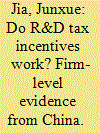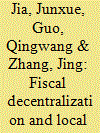| Srl | Item |
| 1 |
ID:
159069


|
|
|
|
|
| Summary/Abstract |
Tax incentives have been used worldwide to encourage firm R&D, but there is little evidence on their effectiveness as a policy tool in developing countries. We use a panel dataset of Chinese listed companies covering 2007 to 2013 to assess the effects of tax incentives on firm R&D expenditures and analyze how institutional conditions shape these effects. Our results show that tax incentives motivate R&D expenditures for our sample firms. A 10% reduction in R&D user costs leads firms to increase R&D expenditures by 3.97% in the short run. We also find considerable effect heterogeneity: Tax incentives significantly stimulate R&D in private firms but have little influence on state-owned enterprises' R&D expenditures. Moreover, the effects of tax incentives are more pronounced for private firms without political connections. Hence, reducing political intervention complements tax incentives' capacity to foster firm R&D in developing countries.
|
|
|
|
|
|
|
|
|
|
|
|
|
|
|
|
| 2 |
ID:
130541


|
|
|
|
|
| Publication |
2014.
|
| Summary/Abstract |
Since the tax-sharing reform in 1994, the Chinese fiscal system has exhibited a marked vertical fiscal imbalance-a mismatch between expenditure and revenue assignments-at the local levels, which may cause the common-pool problem in local governments' behavior. Using a large fiscal dataset at the county level from 1997 to 2006, this paper studies the effects of fiscal decentralization on local expenditure policy and analyzes how the vertical fiscal imbalance shapes these effects. The estimation results show that expenditure decentralization increases government spending and leads to a fund allocation with a larger weight on capital construction and smaller weights on education and administration. In contrast, revenue decentralization has little influence on local government expenditures. We show that the differences in the effects of expenditure and revenue decentralization can be attributed to the distortionary effects caused by the vertical fiscal imbalance and, thus, offer support to the importance of the common-pool problem at the county level of China's fiscal system.
|
|
|
|
|
|
|
|
|
|
|
|
|
|
|
|
| 3 |
ID:
107998


|
|
|
|
|
| Publication |
2011.
|
| Summary/Abstract |
The present paper examines the role of the mix of fiscal and monetary policy rules in determining inflation dynamics using fiscal and monetary policy reaction functions and Markov-switching vector autoregression methods based on quarterly data in the period 1992-2007. Our results show that fiscal and monetary policies in China can be adequately described using some simple rules, and that significant regime shifts took place around 1998. Fiscal policy tended to be active and countercyclical in the pre-1998 period, then switched to be passive and more countercyclical, whereas monetary policy was characterized as passive and procyclical in the pre-1998 period, and switched to be active and countercyclical afterwards. The mix of fiscal and monetary policy rules can explain inflation dynamics better than the monetary policy rule alone. Therefore, price stability requires not only appropriate monetary policy but also appropriate fiscal policy.
|
|
|
|
|
|
|
|
|
|
|
|
|
|
|
|